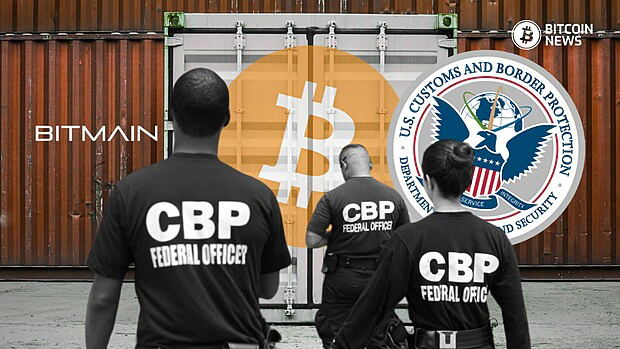Reports have surfaced about the United States Customs and Border Protection (CBP) detaining shipments of Bitmain’s popular Antminer ASIC Bitcoin mining machines at ports across the country, at the request of the Federal Communications Commission (FCC).
This move has caused significant delays for U.S.-based Bitcoin mining companies and sparked speculation about possible links to sanctions violations involving Chinese-made components.
Shipments of latest models, including the Bitmain S21 and T21 series, have reportedly been held at various ports for up to two months.
Seven Bitcoin mining firms in the U.S. have reported significant disruptions, with some companies being charged daily holding fees that have surpassed $200,000 in some cases.
A mining company representative described the delays as “unprecedented,” adding that legal assistance was needed to seek answers due to the lack of standard service.
The detentions have been concentrated at West Coast ports, particularly in San Francisco and Detroit. Some companies have begun advising others to avoid these ports altogether, citing Advanced Targeting Unit (ATU) personnel as involved in identifying the shipments as “high-risk cargo.”
While no official reason has been provided for the delays, industry insiders suspect the issue is tied to scrutiny over chips used in Bitmain’s machines.
Specifically, chips from Xiamen Sophgo, a Chinese semiconductor company, are believed to be under investigation by the U.S. Department of Commerce.
Sophgo has faced allegations of supplying chips to Huawei, the Chinese tech giant that has been under U.S. sanctions since 2019 for national security reasons.
The FCC and CBP are thought to be inspecting Bitmain shipments for restricted components, such as Sophgo’s CV1835 chips.
An industry source expressed concern, stating that the relationship between Sophgo and Bitmain is raising red flags, noting that Sophgo’s CEO, Micree Zhan, is also the co-founder of Bitmain.
“It’s worth noting that Bitmain sources control boards from a variety of vendors, so just because Bitmain used the CV1835 chip for some models, it does not mean that every unit of that model houses the chip in question,” the report read.
“CBP holds extending beyond 30 days with no clear requests of the Importer of Record (IOR) are beyond usual service standards and extremely rare,” the source stated.
The investigation into Sophgo reportedly began after a Taiwan Semiconductor Manufacturing Company (TSMC) chip linked to Sophgo was discovered in a Huawei device. TSMC has since cut ties with Sophgo.
Interestingly, other Chinese ASIC manufacturers, such as MicroBT and Canaan, have not been affected by similar detentions. This has led some to speculate that the issue is specific to Bitmain’s products, further fueling questions about the true motive behind the import holds.
The FCC, when contacted for comment, denied awareness of any orders to halt Bitmain hardware. The CBP, meanwhile, has not provided any public statements regarding the detentions.
Bitmain is one of the largest manufacturers of Bitcoin mining hardware and has a dominant position in the global market. Its machines are widely used by digital asset miners to secure the Bitcoin network and validate transactions.
Related: Why do Bitcoin Transactions Require Confirmations?
Despite these delays, China-based companies like Bitmain have maintained a strong presence in the Bitcoin mining industry, even after the Chinese government banned bitcoin mining in 2021. Many Chinese companies have since relocated operations to other countries, including the United States.
For U.S.-based mining companies, the delays have created a challenging situation. Many firms rely on consistent hardware deliveries to keep their operations running efficiently. With costs escalating due to holding fees, some companies are now facing significant financial strain.
One affected company reported being charged over $200,000 for 200 detained units. A company representative expressed frustration over the lack of communication from CBP and FCC, stating that they are being charged for delays beyond their control.
This situation highlights growing tensions between U.S. trade policies, national security concerns, and the Bitcoin industry.
Former President Donald Trump, who has been vocal about making the U.S. a leader in bitcoin mining, recently reiterated his commitment to creating a “strategic national bitcoin stockpile.” Trump stated in July:
“It will be the policy of my administration to keep 100% of all the Bitcoin the U.S. government currently holds or acquires into the future […] This will serve as the core of the strategic national Bitcoin stockpile […] It’s been taken away from you.”
For now, the affected bitcoin mining companies are left in limbo, waiting for clarity from the CBP and FCC. Legal experts predict that the resolution process could take months, especially if the investigation into Sophgo and its ties to Bitmain continues.
The broader digital asset community is watching closely, as these delays could set a precedent for how governments regulate the importation of bitcoin mining equipment in the future.
While the Bitcoin network remains unaffected, delays in mining operations are causing disruptions and uncertainty. Experts highlight the need for transparency and quick resolutions to maintain the U.S.’s competitiveness in global bitcoin mining.










